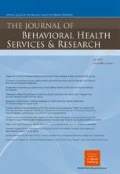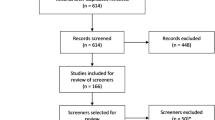Abstract
Within primary care settings, patients with medically unexplained symptoms (MUS) are common, often present with comorbid psychopathology, and have high rates of healthcare utilization. Despite increased healthcare utilization, these patients often have poor outcomes that frustrate patients and providers alike. A behavioral consultation intervention for primary care patients with MUS (n = 10) was developed and assessed. All participants completed all intervention and assessment sessions and rated the intervention favorably. Participants self-report scores revealed statistically significant improvements from baseline to 3-month follow-up on physical functioning, mental functioning, and physical symptoms. Notwithstanding the limitations of open trial designs, these findings demonstrate high feasibility for a behavioral health consultation treatment model for patients with MUS and highlight the need for further research.
Similar content being viewed by others
Notes
Recommendations to PCPs for managing MUS were adapted from previous studies (Smith, 1986, Dickinson, 2002) that demonstrated efficacy for an intervention consisting of sending PCPs a generic letter outlining recommendations for managing MUS patients (e.g., regular visits every 2–8 weeks, limited referrals to specialists, conducting physical exams at every visit, etc.)
References
Brown RJ. Psychological mechanisms of medically unexplained symptoms: an integrative conceptual model. Psychological Bulletin. 2004;130(5):793.
Kroenke K. Patients presenting with somatic complaints: epidemiology, psychiatric co-morbidity and management. International Journal of Methods in Psychiatric Research. 2006;12(1):34–43.
Morriss R, Lindson N, Coupland C, et al. Estimating the prevalence of medically unexplained symptoms from primary care records. Public Health. 2012;126(10):846–854.
Salmon P, Peters S, Clifford R, et al. Why do general practitioners decline training to improve management of medically unexplained symptoms? Journal of General Internal Medicine. 2007;22(5):565–571.
Berwick DM, Nolan TW, Whittington J. The triple aim: care, health, and cost. Health Affairs. 2008;27(3):759–769.
Salmon P, Dowrick CF, Ring A, et al. Voiced but unheard agendas: qualitative analysis of the psychosocial cues that patients with unexplained symptoms present to general practitioners. The British Journal of General Practice. 2004;54(500):171.
Kroenke K. Efficacy of treatment for somatoform disorders: a review of randomized controlled trials. Psychosomatic Medicine. 2007;69(9):881–888.
Barsky AJ, Orav EJ, Bates DW. Somatization increases medical utilization and costs independent of psychiatric and medical comorbidity. Archives of General Psychiatry. 2005;62(8):903.
Blount A. Integrated Primary Care: Organizing the Evidence. Families, Systems, & Health. 2003;21(2):121.
Goldberg D, Gask L, O’Dowd T. The treatment of somatization: teaching techniques of reattribution. Journal of Psychosomatic Research. 1989;33(6):689–695.
Gask L, Dowrick C, Salmon P, et al. Reattribution reconsidered: narrative review and reflections on an educational intervention for medically unexplained symptoms in primary care settings. Journal of Psychosomatic Research. 2011;71(5):325–334.
Rief W, Broadbent E. Explaining medically unexplained symptoms-models and mechanisms. Clinical Psychology Review. 2007;27(7):821–841.
Salmon P, Humphris GM, Ring A, et al. Primary care consultations about medically unexplained symptoms: patient presentations and doctor responses that influence the probability of somatic intervention. Psychosomatic Medicine. 2007;69(6):571–577.
Kirmayer LJ, Groleau D, Looper KJ, et al. Explaining medically unexplained symptoms. The Canadian Journal of Psychiatry/La Revue Canadienne de Psychiatrie. 2004;49:663–671.
Nettleton S. “I just want permission to be ill”: Towards a sociology of medically unexplained symptoms. Social Science & Medicine. 2006;62(5):1167–1178.
Smith RC, Lyles JS, Gardiner JC, et al. Primary care clinicians treat patients with medically unexplained symptoms: a randomized controlled trial. Journal of General Internal Medicine. 2006;21(7):671–677.
Escobar JI, Gara MA, Diaz-Martinez AM, et al. Effectiveness of a time-limited cognitive behavior therapy type intervention among primary care patients with medically unexplained symptoms. Annals of Family Medicine. 2007;5(4):328–335.
Burton C, Weller D, Marsden W, et al. A primary care Symptoms Clinic for patients with medically unexplained symptoms: pilot randomised trial. BMJ Open. 2012;2:e000513.
Salmon P, Wissow L, Carroll J, et al. Doctors’ responses to patients with medically unexplained symptoms who seek emotional support: criticism or confrontation? General Hospital Psychiatry. 2007;29(5):454–460.
Ring A, Dowrick C, Humphris G, et al. Do patients with unexplained physical symptoms pressurise general practitioners for somatic treatment? A qualitative study. British Medical Journal. 2004;328(7447):1057–1069.
Salmon P, Ring A, Humphris GM, et al. Primary care consultations about medically unexplained symptoms: how do patients indicate what they want? Journal of General Internal Medicine. 2009;24(4):450–456.
Leon AC, Davis LL, Kraemer HC. The role and interpretation of pilot studies in clinical research. Journal of Psychiatric Research. 2011;45(5):626–629.
Rounsaville BJ, Carroll KM, Onken LS. A stage model of behavioral therapies research: Getting started and moving on from stage 1. Clinical Psychology: Science and Practice. 2001;8(2):133–142.
Peveler R, Kilkenny L, Kinmonth AL. Medically unexplained physical symptoms in primary care: a comparison of selfreport screening questionnaires and clinical opinion. Journal of Psychosomatic Research. 1997;42(3):245–252.
Peek CJ. Lexicon for Behavioral Health and Primary Care Integration: Concepts and Definitions Developed by Expert Consensus. AHRQ Publication No.13-IP001-EF. 2013. Accessed 12/12/14.
Groleau D, Young A, Kirmayer LJ. The McGill Illness Narrative Interview (MINI): an interview schedule to elicit meanings and modes of reasoning related to illness experience. Transcultural Psychiatry. 2006;43(4):671–691.
Martell CR, Dimidjian S, Herman-Dunn R. Behavioral activation for depression: A clinician’s guide. New York: Guilford Press; 2010.
Smith GR, Monson RA, Ray DC. Psychiatric consultation in somatization disorder: a randomized controlled study. The New England Journal of Medicine. 1986;1407–1413.
Dickinson WP, Dickinson LM, Main DS, et al. A randomized clinical trial of a care recommendation letter intervention for somatization in primary care. The Annals of Family Medicine. 2003;1(4):228–235.
Devilly GJ, Borkovec TD. Psychometric properties of the credibility/expectancy questionnaire. Journal of Behavior Therapy and Experimental Psychiatry. 2000;31(2):73–86.
Ware JE, Jr., Sherbourne CD. The MOS 36-item short-form health survey (SF-36). I. Conceptual framework and item selection. Medical Care. 1992;30(6):473–483.
Kroenke K, Spitzer RL, Williams JB. The PHQ-15: validity of a new measure for evaluating the severity of somatic symptoms. Psychosomatic Medicine. 2002;64(2):258–266.
Kroenke K, Spitzer RL, Williams JB. The PHQ-9: validity of a brief depression severity measure. Journal of General Internal Medicine. 2001;16(9):606–613.
Spitzer RL, Kroenke K, Williams JB, et al. A brief measure for assessing generalized anxiety disorder: the GAD-7. Archives of Internal Medicine. 2006;166(10):1092–1097.
Salkovskis PM, Rimes KA, Warwick HM, et al. The Health Anxiety Inventory: development and validation of scales for the measurement of health anxiety and hypochondriasis. Psychological Medicine. 2002;32(5):843–853.
Allen LA, Woolfolk RL, Escobar JI, et al. Cognitive-behavioral therapy for somatization disorder: a randomized controlled trial. Archives of Internal Medicine. 2006;166(14):1512–1518.
Author information
Authors and Affiliations
Corresponding author
Rights and permissions
About this article
Cite this article
Hubley, S., Uebelacker, L.A., Nash, J. et al. Open Trial of Integrated Primary Care Consultation for Medically Unexplained Symptoms. J Behav Health Serv Res 44, 590–601 (2017). https://doi.org/10.1007/s11414-016-9528-5
Published:
Issue Date:
DOI: https://doi.org/10.1007/s11414-016-9528-5



